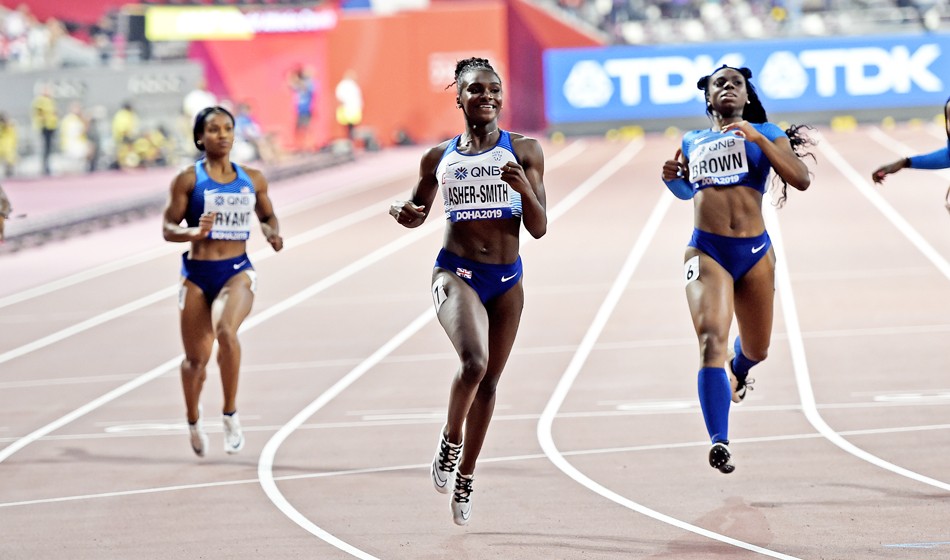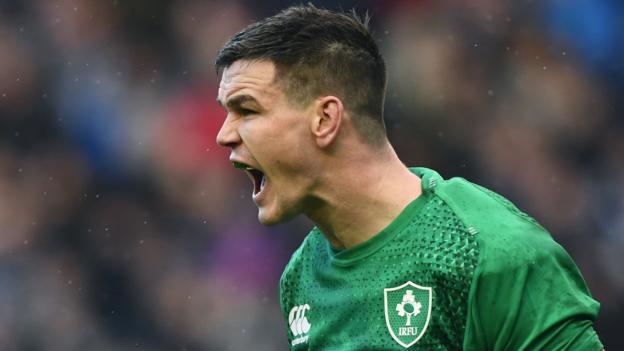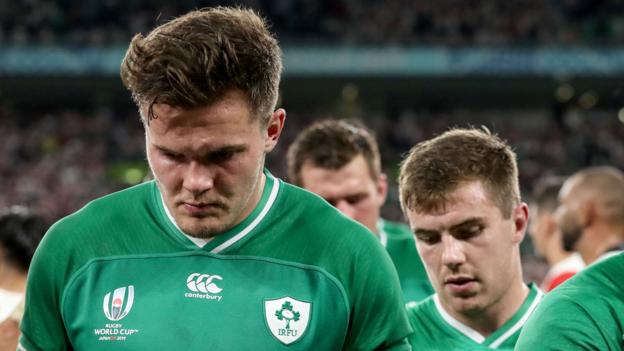Ireland aim to get their World Cup campaign back on track against Russia knowing only a bonus-point win will keep them on track for a quarter-final.
Despite defeat by Japan, Joe Schmidt's side are second in Pool A but Scotland and Samoa are just a point behind.
Schmidt makes 11 changes from last Saturday with fit-again Johnny Sexton captaining Ireland for the first time.
Russia, without a point so far, are captained by Vasily Artemyev, who studied in Dublin as a teenager.
Coach Lyn Jones makes nine changes from the 34-9 defeat by Samoa with six new faces in the pack.
Ireland have comfortably won the two previous meetings between the sides and go into the contest as overwhelming favourites.
Behind an all-Munster front five, Jordi Murphy will make his first appearance of the tournament just five days after landing in the country having been called upon to replace the injured Jack Conan.
Sexton, seen for many years as one of the team's key figures, earns his 86th cap as he partners Leinster team-mate Luke McGrath at half-back.
Kobe conditions could cause handling havoc
With temperatures in Kobe set to reach 28 degrees on Thursday, much of the short build-up to the game has focused around the conditions inside the Misaki Stadium.
England and Scotland have already won at the venue in this tournament, however both games were littered with an unusually high number of handling errors, down in no small part to the intensely humid conditions at the indoor stadium.
Sexton and hooker Niall Scannell have said that although the conditions will undoubtedly be factored into the team's thinking, Ireland will not be deterred from playing their usual game.
Despite last weekend's shock defeat, Schmidt remains confident that Ireland can still be a factor in the closing stages of the tournament.
"I'm still incredibly positive about this group," the New Zealander said.
"They are such a good group of young men that they are determined to make sure we get it right in these next two games.
"Then beyond that, it doesn't matter which team you play in the pool next door to us."
Russia playing for pride
Russia, playing at their second World Cup, have shipped 64 points in their opening two games scoring just one try.
However they did briefly threaten to spoil Japan's opening night party when they took the lead against the hosts, before crumbling in a one-sided second half.
Skipper Artemyev is one of three Russian players to have featured in all six of the country's World Cup matches so far.
The full-back will lead his side out as they look for an improbable first World Cup win against a wounded Ireland, looking to bounce back from their first defeat to a non-Tier One nation in 23 years.
The teams
Ireland: Kearney; Conway, Ringrose, Aki, Earls; Sexton (capt), McGrath; Kilcoyne, Scannell, Ryan, Kleyn, Beirne, Ruddock, O'Mahony, Murphy
Replacements: Cronin, Porter, Furlong, Henderson, Stander, Carty, Carbery, Larmour
Russia: Artemyev; Davydov, Galinovskiy, Golosnitskiy, Simplikevich; Gaisin, Perov; Polivalov, Matveev, Gotovtsev, Garbuzov, Fedotko; Sychev, Gadzhiev, Gresev.
Replacements: Selskii, Morozov, Podrezov, Ostrikov, Elgin, Ianiushkin, Khodin, Ostroushkosday.
What they said
Ireland head coach Joe Schmidt: "We've got some guys who have been very, very keen to be involved,.
"We do need to make sure everyone is ready. It is pretty tough with the six-day turnaround and the five-day turnaround."
Russia coach Lyn Jones: "We are facing probably the toughest challenge that Russian rugby has ever faced.
"The challenge for us is to make sure that we make life as difficult for Ireland and to score as many tries as we can."
Match stats
For the latest rugby union news follow @bbcrugbyunion on Twitter.

























 Phone: (800) 737. 6040
Phone: (800) 737. 6040 Fax: (800) 825 5558
Fax: (800) 825 5558 Website:
Website:  Email:
Email: 






